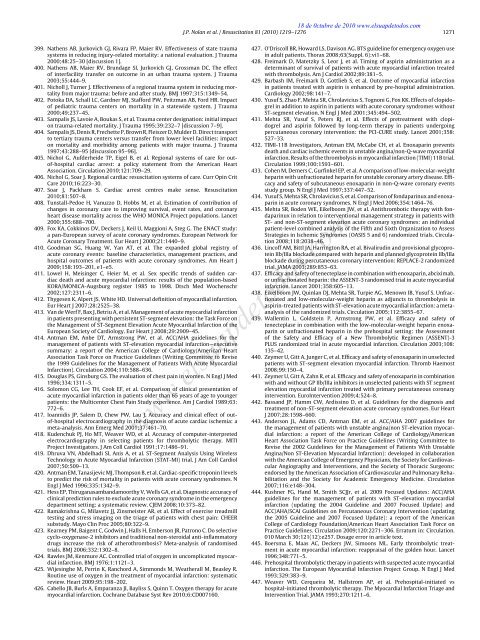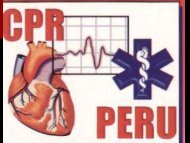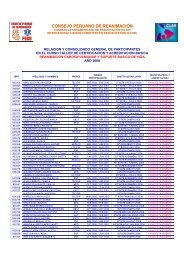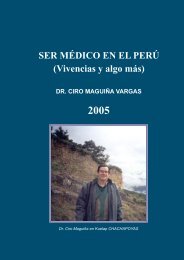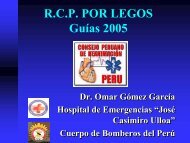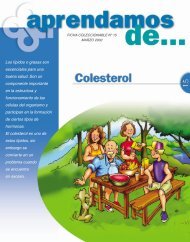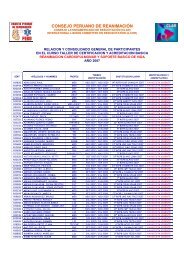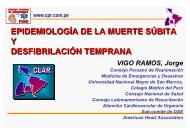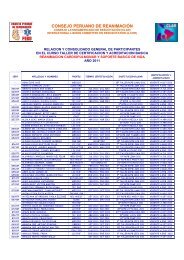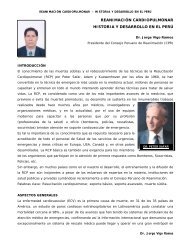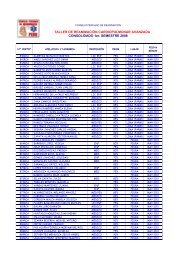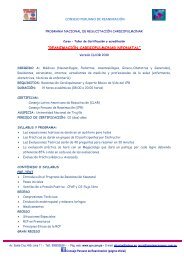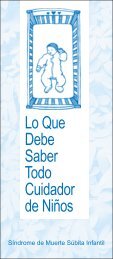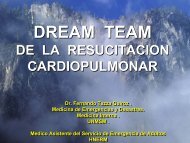European Resuscitation Council Guidelines for Resuscitation ... - CPR
European Resuscitation Council Guidelines for Resuscitation ... - CPR
European Resuscitation Council Guidelines for Resuscitation ... - CPR
You also want an ePaper? Increase the reach of your titles
YUMPU automatically turns print PDFs into web optimized ePapers that Google loves.
18 de 0ctubre de 2010 www.elsuapdetodos.comJ.P. Nolan et al. / <strong>Resuscitation</strong> 81 (2010) 1219–1276 1271399. Nathens AB, Jurkovich GJ, Rivara FP, Maier RV. Effectiveness of state traumasystems in reducing injury-related mortality: a national evaluation. J Trauma2000;48:25–30 [discussion 1].400. Nathens AB, Maier RV, Brundage SI, Jurkovich GJ, Grossman DC. The effectof interfacility transfer on outcome in an urban trauma system. J Trauma2003;55:444–9.401. Nicholl J, Turner J. Effectiveness of a regional trauma system in reducing mortalityfrom major trauma: be<strong>for</strong>e and after study. BMJ 1997;315:1349–54.402. Potoka DA, Schall LC, Gardner MJ, Staf<strong>for</strong>d PW, Peitzman AB, Ford HR. Impactof pediatric trauma centers on mortality in a statewide system. J Trauma2000;49:237–45.403. Sampalis JS, Lavoie A, Boukas S, et al. Trauma center designation: initial impacton trauma-related mortality. J Trauma 1995;39:232–7 [discussion 7–9].404. Sampalis JS, Denis R, Frechette P, Brown R, Fleiszer D, Mulder D. Direct transportto tertiary trauma centers versus transfer from lower level facilities: impacton mortality and morbidity among patients with major trauma. J Trauma1997;43:288–95 [discussion 95–96].405. Nichol G, Aufderheide TP, Eigel B, et al. Regional systems of care <strong>for</strong> outof-hospitalcardiac arrest: a policy statement from the American HeartAssociation. Circulation 2010;121:709–29.406. Nichol G, Soar J. Regional cardiac resuscitation systems of care. Curr Opin CritCare 2010;16:223–30.407. Soar J, Packham S. Cardiac arrest centres make sense. <strong>Resuscitation</strong>2010;81:507–8.408. Tunstall-Pedoe H, Vanuzzo D, Hobbs M, et al. Estimation of contribution ofchanges in coronary care to improving survival, event rates, and coronaryheart disease mortality across the WHO MONICA Project populations. Lancet2000;355:688–700.409. Fox KA, Cokkinos DV, Deckers J, Keil U, Maggioni A, Steg G. The ENACT study:a pan-<strong>European</strong> survey of acute coronary syndromes. <strong>European</strong> Network <strong>for</strong>Acute Coronary Treatment. Eur Heart J 2000;21:1440–9.410. Goodman SG, Huang W, Yan AT, et al. The expanded global registry ofacute coronary events: baseline characteristics, management practices, andhospital outcomes of patients with acute coronary syndromes. Am Heart J2009;158:193–201, e1–e5.411. Lowel H, Meisinger C, Heier M, et al. Sex specific trends of sudden cardiacdeath and acute myocardial infarction: results of the population-basedKORA/MONICA-Augsburg register 1985 to 1998. Dtsch Med Wochenschr2002;127:2311–6.412. Thygesen K, Alpert JS, White HD. Universal definition of myocardial infarction.Eur Heart J 2007;28:2525–38.413. Van de Werf F, Bax J, Betriu A, et al. Management of acute myocardial infarctionin patients presenting with persistent ST-segment elevation: the Task Force onthe Management of ST-Segment Elevation Acute Myocardial Infarction of the<strong>European</strong> Society of Cardiology. Eur Heart J 2008;29:2909–45.414. Antman EM, Anbe DT, Armstrong PW, et al. ACC/AHA guidelines <strong>for</strong> themanagement of patients with ST-elevation myocardial infarction—executivesummary: a report of the American College of Cardiology/American HeartAssociation Task Force on Practice <strong>Guidelines</strong> (Writing Committee to Revisethe 1999 <strong>Guidelines</strong> <strong>for</strong> the Management of Patients With Acute MyocardialInfarction). Circulation 2004;110:588–636.415. Douglas PS, Ginsburg GS. The evaluation of chest pain in women. N Engl J Med1996;334:1311–5.416. Solomon CG, Lee TH, Cook EF, et al. Comparison of clinical presentation ofacute myocardial infarction in patients older than 65 years of age to youngerpatients: the Multicenter Chest Pain Study experience. Am J Cardiol 1989;63:772–6.417. Ioannidis JP, Salem D, Chew PW, Lau J. Accuracy and clinical effect of outof-hospitalelectrocardiography in the diagnosis of acute cardiac ischemia: ameta-analysis. Ann Emerg Med 2001;37:461–70.418. Kudenchuk PJ, Ho MT, Weaver WD, et al. Accuracy of computer-interpretedelectrocardiography in selecting patients <strong>for</strong> thrombolytic therapy. MITIProject Investigators. J Am Coll Cardiol 1991;17:1486–91.419. Dhruva VN, Abdelhadi SI, Anis A, et al. ST-Segment Analysis Using WirelessTechnology in Acute Myocardial Infarction (STAT-MI) trial. J Am Coll Cardiol2007;50:509–13.420. Antman EM, Tanasijevic MJ, Thompson B, et al. Cardiac-specific troponin I levelsto predict the risk of mortality in patients with acute coronary syndromes. NEngl J Med 1996;335:1342–9.421. Hess EP, Thiruganasambandamoorthy V, Wells GA, et al. Diagnostic accuracy ofclinical prediction rules to exclude acute coronary syndrome in the emergencydepartment setting: a systematic review. CJEM 2008;10:373–82.422. Ramakrishna G, Milavetz JJ, Zinsmeister AR, et al. Effect of exercise treadmilltesting and stress imaging on the triage of patients with chest pain: CHEERsubstudy. Mayo Clin Proc 2005;80:322–9.423. Kearney PM, Baigent C, Godwin J, Halls H, Emberson JR, Patrono C. Do selectivecyclo-oxygenase-2 inhibitors and traditional non-steroidal anti-inflammatorydrugs increase the risk of atherothrombosis? Meta-analysis of randomisedtrials. BMJ 2006;332:1302–8.424. Rawles JM, Kenmure AC. Controlled trial of oxygen in uncomplicated myocardialinfarction. BMJ 1976;1:1121–3.425. Wijesinghe M, Perrin K, Ranchord A, Simmonds M, Weatherall M, Beasley R.Routine use of oxygen in the treatment of myocardial infarction: systematicreview. Heart 2009;95:198–202.426. Cabello JB, Burls A, Emparanza JI, Bayliss S, Quinn T. Oxygen therapy <strong>for</strong> acutemyocardial infarction. Cochrane Database Syst Rev 2010;6:CD007160.427. O’Driscoll BR, Howard LS, Davison AG. BTS guideline <strong>for</strong> emergency oxygen usein adult patients. Thorax 2008;63(Suppl. 6):vi1–68.428. Freimark D, Matetzky S, Leor J, et al. Timing of aspirin administration as adeterminant of survival of patients with acute myocardial infarction treatedwith thrombolysis. Am J Cardiol 2002;89:381–5.429. Barbash IM, Freimark D, Gottlieb S, et al. Outcome of myocardial infarctionin patients treated with aspirin is enhanced by pre-hospital administration.Cardiology 2002;98:141–7.430. Yusuf S, Zhao F, Mehta SR, Chrolavicius S, Tognoni G, Fox KK. Effects of clopidogrelin addition to aspirin in patients with acute coronary syndromes withoutST-segment elevation. N Engl J Med 2001;345:494–502.431. Mehta SR, Yusuf S, Peters RJ, et al. Effects of pretreatment with clopidogreland aspirin followed by long-term therapy in patients undergoingpercutaneous coronary intervention: the PCI-CURE study. Lancet 2001;358:527–33.432. TIMI-11B Investigators, Antman EM, McCabe CH, et al. Enoxaparin preventsdeath and cardiac ischemic events in unstable angina/non-Q-wave myocardialinfarction. Results of the thrombolysis in myocardial infarction (TIMI) 11B trial.Circulation 1999;100:1593–601.433. Cohen M, Demers C, Gurfinkel EP, et al. A comparison of low-molecular-weightheparin with unfractionated heparin <strong>for</strong> unstable coronary artery disease. Efficacyand safety of subcutaneous enoxaparin in non-Q-wave coronary eventsstudy group. N Engl J Med 1997;337:447–52.434. Yusuf S, Mehta SR, Chrolavicius S, et al. Comparison of fondaparinux and enoxaparinin acute coronary syndromes. N Engl J Med 2006;354:1464–76.435. Mehta SR, Boden WE, Eikelboom JW, et al. Antithrombotic therapy with fondaparinuxin relation to interventional management strategy in patients withST- and non-ST-segment elevation acute coronary syndromes: an individualpatient-level combined analysis of the Fifth and Sixth Organization to AssessStrategies in Ischemic Syndromes (OASIS 5 and 6) randomized trials. Circulation2008;118:2038–46.436. Lincoff AM, Bittl JA, Harrington RA, et al. Bivalirudin and provisional glycoproteinIIb/IIIa blockade compared with heparin and planned glycoprotein IIb/IIIablockade during percutaneous coronary intervention: REPLACE-2 randomizedtrial. JAMA 2003;289:853–63.437. Efficacy and safety of tenecteplase in combination with enoxaparin, abciximab,or unfractionated heparin: the ASSENT-3 randomised trial in acute myocardialinfarction. Lancet 2001;358:605–13.438. Eikelboom JW, Quinlan DJ, Mehta SR, Turpie AG, Menown IB, Yusuf S. Unfractionatedand low-molecular-weight heparin as adjuncts to thrombolysis inaspirin-treated patients with ST-elevation acute myocardial infarction: a metaanalysisof the randomized trials. Circulation 2005;112:3855–67.439. Wallentin L, Goldstein P, Armstrong PW, et al. Efficacy and safety oftenecteplase in combination with the low-molecular-weight heparin enoxaparinor unfractionated heparin in the prehospital setting: the Assessmentof the Safety and Efficacy of a New Thrombolytic Regimen (ASSENT)-3PLUS randomized trial in acute myocardial infarction. Circulation 2003;108:135–42.440. Zeymer U, Gitt A, Junger C, et al. Efficacy and safety of enoxaparin in unselectedpatients with ST-segment elevation myocardial infarction. Thromb Haemost2008;99:150–4.441. Zeymer U, Gitt A, Zahn R, et al. Efficacy and safety of enoxaparin in combinationwith and without GP IIb/IIIa inhibitors in unselected patients with ST segmentelevation myocardial infarction treated with primary percutaneous coronaryintervention. EuroIntervention 2009;4:524–8.442. Bassand JP, Hamm CW, Ardissino D, et al. <strong>Guidelines</strong> <strong>for</strong> the diagnosis andtreatment of non-ST-segment elevation acute coronary syndromes. Eur HeartJ 2007;28:1598–660.443. Anderson JL, Adams CD, Antman EM, et al. ACC/AHA 2007 guidelines <strong>for</strong>the management of patients with unstable angina/non ST-elevation myocardialinfarction: a report of the American College of Cardiology/AmericanHeart Association Task Force on Practice <strong>Guidelines</strong> (Writing Committee toRevise the 2002 <strong>Guidelines</strong> <strong>for</strong> the Management of Patients With UnstableAngina/Non ST-Elevation Myocardial Infarction): developed in collaborationwith the American College of Emergency Physicians, the Society <strong>for</strong> CardiovascularAngiography and Interventions, and the Society of Thoracic Surgeons:endorsed by the American Association of Cardiovascular and Pulmonary Rehabilitationand the Society <strong>for</strong> Academic Emergency Medicine. Circulation2007;116:e148–304.444. Kushner FG, Hand M, Smith SCJJr, et al. 2009 Focused Updates: ACC/AHAguidelines <strong>for</strong> the management of patients with ST-elevation myocardialinfarction (updating the 2004 Guideline and 2007 Focused Update) andACC/AHA/SCAI <strong>Guidelines</strong> on Percutaneous Coronary Intervention (updatingthe 2005 Guideline and 2007 Focused Update): a report of the AmericanCollege of Cardiology Foundation/American Heart Association Task Force onPractice <strong>Guidelines</strong>. Circulation 2009;120:2271–306. Erratum in: Circulation.010 March 30;121(12):e257. Dosage error in article text.445. Boersma E, Maas AC, Deckers JW, Simoons ML. Early thrombolytic treatmentin acute myocardial infarction: reappraisal of the golden hour. Lancet1996;348:771–5.446. Prehospital thrombolytic therapy in patients with suspected acute myocardialinfarction. The <strong>European</strong> Myocardial Infarction Project Group. N Engl J Med1993;329:383–9.447. Weaver WD, Cerqueira M, Hallstrom AP, et al. Prehospital-initiated vshospital-initiated thrombolytic therapy. The Myocardial Infarction Triage andIntervention Trial. JAMA 1993;270:1211–6.www.elsuapdetodos.com


